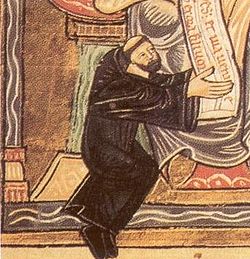St. Odo of Cluny
by VP
Posted on Sunday November 17, 2024 at 11:00PM in Saints
 St. Odo of Cluny
St. Odo of Cluny" On Christmas-eve, A.D. 877, a noble of Aquitaine implored Our Lady to grant him a son. His prayer was heard; Odo was born, and his grateful father offered him to St. Martin. Odo grew in wisdom and in virtue, and his father longed to see him shine at court. But the attraction of grace was too strong. Odo's heart was sad and his health failed, until he forsook the world and sought refuge under the shadow of St. Martin at Tours. Later on he took the habit of St. Benedict at Baume, and was compelled to become abbot of the great abbey of Cluny, which was then building. He ruled it with the hand of a master and the winningness of a Saint. The Pope sent for him often to aot as peacemaker between contending princes, and it was on one of those missions of mercy that he was taken ill at Rome. At his urgent entreaty he was borne back to Tours, where he died at the feet of "his own St. Martin," A.D. 942.
Reflection." It needs only," says Father Newman, "for a Catholic to show devotion to any-Saint, in order to receive special benefits from his intercession."
"The Mass" says St. Odo, Abbot of Cluny, "is the act on which is based the salvation of the World." The Holy Mass: The Sacrifice for the Living and the Dead, by Rev. Fr Michael Müller 1875 p 288.
"When and how was this yearly commemoration of the
departed introduced? The time of the introduction of this commemoration
cannot be determined; for as easily as the time of Tertullian he
mentions that the Christians of his day held a yearly commemoration of
the dead. Towards the end of the tenth century St. Odo, abbot of the
Benedictines, at Cluny, directed this feast to be celebrated yearly, on
the 2nd of November in all the convents of his Order, which usage was
afterwards enjoined upon the whole Christian world by Pope John XVI. The
feast of this day was probably established in order that, after having
on day before rejoiced over the glory of the saints in heaven, we should
this day remember in love those who are sighing in purgatory for
deliverance.
Prayer: O God, the Creator and Redeemer of
all the faithful, grant to the souls of Thy servants departed the
remission of all their sins, that, by our pious supplications, they may
obtain the pardon which they have always desires. Who livest and
reignest,etc. All Souls' Day. p456 Devout Instructions on the Epistles and Gospels for the Sundays and Holydays Front Cover Leonhard Goffiné Benziger, 1896
Seventeeth Day: The Manner in which the Church bestows Indulgences upon the Souls in Purgatory
by VP
Posted on Sunday November 17, 2024 at 12:00AM in Meditations
The Church does not apply indulgences to the souls in Purgatory as she does to the faithful upon earth through the tribunal of penance and absolution, but confers them simply through pious supplications and sacrifices offered in their behalf; thus they are relieved indirectly. Holy Church opens her rich treasures of merit and satisfaction in proportion to the suffrage of the faithful, who offer expiation and fervent prayers to God for the relief of the suffering souls.
God has reserved to Himself the right to accept entirely, or in part, the satisfaction offered for any soul in Purgatory. This acceptance depends upon His holy and adorable Will, and perhaps, in great measure upon the care of the soul to render herself worthy of the Divine Assistance during her earthly career. Besides, there may be some obligation neglected by the person who intends to gain the indulgence, owing to ignorance or forgetfulness on his part.
Therefore, we have no assurance whatever that an indulgence given by us to the souls has had the desired effect. Considering this, we should prepare most carefully, and fulfill all obligations required for gaining an indulgence. However, let us place with entire confidence in the tender hand of Divine Mercy the application of indulgences to departed souls who are especially dear to us.
Prayer: Have mercy, O Lord, upon the suffering souls in Purgatory; mitigate the severity of Thy judgments; let the infinite merits of Thine only begotten Son and those of Thy saints assist the holy souls and deliver them from their sufferings. Through Christ Our Lord. Amen.
Prayer for Priests in Purgatory: My Jesus, by the sorrows Thou didst suffer in Thine Agony in the Garden, in Thy Scourging and Crowning with thorns, in the Way to Calvary, in Thy Crucifixion and Death, have mercy on the souls of priests in Purgatory, especially those most forgotten and who have no one else to pray for them. I wish to remember all those priests who ministered to me, the priests my heart has never forgotten, and for those that I no longer recall due to my frailty of memory. Do Thou deliver them from the dire torments they endure; call them and admit them to Thy most sweet embrace in Paradise.
Pope Saint Pius X and Saint John Vianney, pray for us and especially for our priests. Amen
Special Intercession: Pray for the souls of those who neglected to gain indulgences for the souls in Purgatory.
Lord grant them eternal rest, and let perpetual light shine upon them. May they rest in peace. Amen. (three times)
Invocation: My Jesus, mercy!
Source: Manual of the Purgatorian Society, Redemptorist Fathers. 1907
